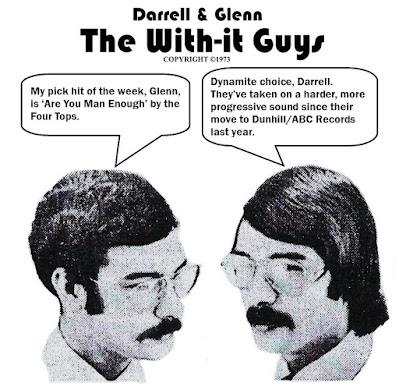Turning the clocks back to 1973, year of The Dry Look…
“Darrell and Glenn, the With-it Guys” was a single-panel comic feature syndicated to newspapers and used mostly as filler content, appearing in dozens of dailies and weekly papers in 1973. It was distributed by American Mutual Syndicate, known primarily for third-tier comic strips like “Neal the Mean” and “Swamp Rats,” and third-tier columnists such as grumpy elderly commentator Leonard Rodney Ford and a beer can collectors’ column by someone calling himself “Jacob Keglined.”
“Darrell & Glenn” featured two young men with wire-rim glasses and mustaches, with Darrell always appearing on the left side of the panel wearing short hair and sideburns and Glenn on the right with longer hair. The same images were used in every panel.
The guys mused about things going on in the current culture, staying away from heady topics such as the Watergate scandal and abortion, instead focusing on things like the Energy Crisis, interior decorating, pop-top cans, Shell No-Pest Strips, rock ‘n’ roll records and Geritol commercials.
“Darrell & Glenn” was aimed at the young adult newspaper reader at a time when newspapers tried to have something for everybody. Promotional materials from American Mutual Syndicate sent out to newspaper editors said the feature appealed to “the with-it, Now generation—men and women between the ages of 18 to 35, a target consumer of many of your advertisers. Those with-it people know what’s happening and know where it’s at. Darrell & Glenn talk to them. Straight to the point without any bunk or bull. In addition, children and teens look up to them and little old ladies think they’re ‘nice boys.’ Are you with the With-it Guys?”
It was an interesting glimpse into what was conventional wisdom in 1973, some of which hasn’t aged so well.
Remember when pay phones were important and necessary? And local calls were only ten cents? (Click the panels to enlarge.)
How the incredible, edible egg stood in what was the Year of Shortages.
A few newspapers that published this one received some critical letters to the editor pointing out there is no mention of the environmental hazards of those "convenient" pop top cans. Another letter writer took offense that Glenn seemed to be excluding women in his comment about them.
A since-banned insecticide product marketed by a major oil company dangled from light fixtures and ceilings in early '70s homes.
Referencing a controversial commercial for an iron supplement called Geritol that featured a husband saying, "My wife. I think I'll keep her."
Another pick hit of the week. Longtime Motown artists the Four Tops had recently switched labels to Dunhill/ABC.
Confronting the Energy Crisis with a 55 MPH speed limit. This one actually received a lot of praise at the time.


.jpg)


.jpg)
.jpg)

.jpg)

.jpg)
No comments:
Post a Comment